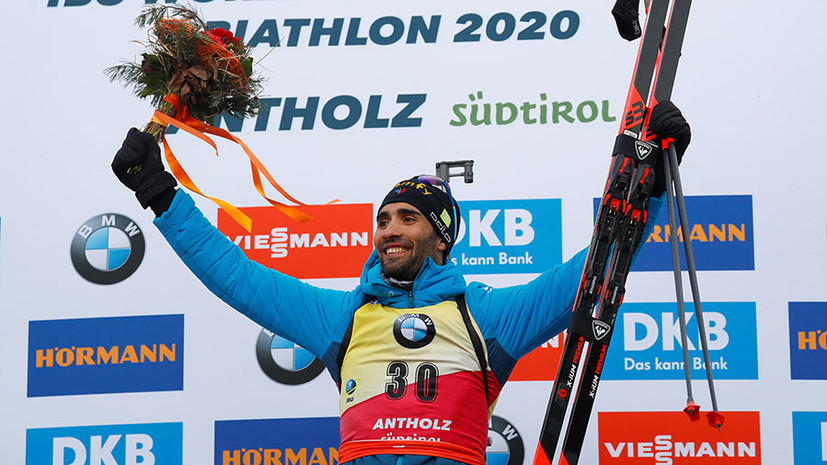The end of the biathlon season brought the fans several sad news at once. In addition to the fact that the final stage of the World Cup in Holmenkollen was canceled due to the coronavirus, the competition program in Kontiolahti was reduced, and the races in Nove Mesto took place without spectators, the career of one of the greatest shooting skiers in history - Martin Fourcade, ended. The Frenchman quite unexpectedly announced his retirement from the sport at the age of 31.
The five-time Olympic champion announced his decision after the sprint race in Finland, in which he took second place, losing only to the Norwegian Johannes Boe. Fourcade wrote on Twitter: “Thank you for the trip, it's time to say goodbye, and then left a farewell letter to Facebook for the fans.
Thanks for the journey 💙
Time to say goodbye. pic.twitter.com/TOU7uQpW84
“My desire to do everything possible, to reach the heights is always with me. But the continuation of my formation as a person, as a father, must now take a different path, find a different expression. Passion for sports has remained with me. My love for the sport as a whole, as well as for the values of overcoming myself and the respect of others that he instills, is stronger than ever. It is in this world that I want to continue to express myself, invest and share. When I say goodbye to you, I am very excited, but at the same time calm. I remember these places, these faces, emotions that left a mark in my career. These doubts and trials that I have overcome, these dreams come true. I leave part of my life behind, inspired by everything that remains to be done, ”Fourcade wrote.
The Frenchman separately thanked fans from different countries, including Russia, and listed his opponents, the struggle with which gave him the most vivid emotions - Ole Einar Bjoerndalen, Emil Hegle Svendsen, Anton Shipulin, Simon Shemp and Johannes Boe. Fourcade admitted that he thought about leaving immediately after the 2018 Olympics, but remained and is now glad to leave with two more gold medals of the World Cup won in Anterselva.
Fourcade definitely entered the history of biathlon as one of the best athletes. During his career, he won five Olympic gold medals and two silver medals, which no Frenchman has achieved in winter sports. He also has 13 victories at world championships, ten silver and five bronze awards. In terms of the number of titles in the main biathlon competitions, Fourcade is second only to the great Bjoerndalen.
But he still beat the Norwegian in another indicator - in terms of the number of Crystal Globes won. Fourcade won seven times in the overall World Cup standings, and in some disciplines he scored the most points 26 times. The Frenchman dominated from the 2011/12 season and right up to the Olympic Games in Pyeongchang - during this time he missed only four Small Crystal Globes. Fourcade lacked just a few victories in his personal World Cup races to break Bjorndalen's record.
Fourcade went skiing, and then biathlon, following the example of his older brother Simon. For some time, Martin had to be in his shadow, but very soon he got rid of the “younger” registry to his last name. At the Olympics in Vancouver ten years ago, he unexpectedly became a silver medalist in the mass start, and from that moment on his dizzying career started really. Already in 2011, Fourcade collected medals of all virtues at the World Cup and since then has invariably won new titles at each subsequent major start of the season.
The exception was 2019. Fourcade got off to a good start that season, winning the first two stages of the World Cup, but then began his long, medal-free series, which lasted almost 12 months. At that moment, the fans were worried that Fourcade would no longer be able to compete with younger rivals, especially Johannes Boe, who just won one race after another with amazing frequency. It seemed that the Frenchman risked ending his career as sadly as Bjoerndalen - the Norwegian competed for so long that they simply stopped holding him in the national team because of poor results.
This season, Fourcade also began to be squeezed by their own compatriots, who had only recently dreamed of being in the same team with him. But circumstances helped the great champion to beautifully complete a great career. Fourcade won all the races that Beau refused because of the birth of a child, and became the leader of the World Cup. The subsequent championship of the planet at the same time strengthened the position of the Frenchman, and made him think about the future. Fourcade won gold in the individual race and for the first time celebrated the victory in the relay - with those who could lead the French team in the next season.
After the World Cup, Boe went on the counterattack and began to quickly catch up with Fourcade, but the Frenchman was lucky again - the cancellation of the last stage in Holmenkollen allowed him to hold the final pursuit race in the yellow shirt of the World Cup leader, with whom he had not parted for years.
Fourcade’s last exit to the start left a double feeling for the fans. He won, which is what any athlete who finishes his career dreams of, but Boe managed to win the Big Crystal Globe anyway. Fourcade left the sport, as if passing this trophy to someone who should become the next great biathlete after him.

